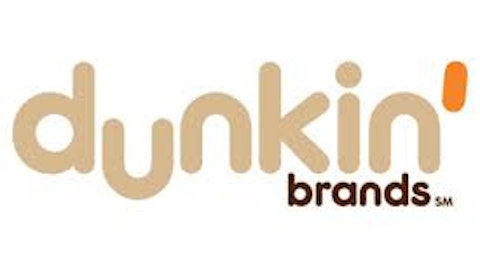Starbucks Corporation (NASDAQ:SBUX) and Whole Foods Market, Inc. (NASDAQ:WFM) are both stocks purchased for the real-money Prosocial Portfolio I manage for Fool.com. I own shares of both companies in my personal portfolio and have followed both for many years. A fresh arrangement between these two top-of-class companies is a natural fit.
After Starbucks Corporation (NASDAQ:SBUX)’ late 2011 acquisition of juice company Evolution Fresh, one thing was clear: The coffee giant has been in the process of diversifying to include increasingly health-oriented products in its business. Now we see a big move: Evolution Fresh’s further moves into mainstream consumption and even additional products.

Evolution Fresh juices use a high-pressure, cold-pressed processing technology. This technology never uses heat, which can reduce the healthful benefits of fruits’ and vegetables’ nutrients. The company also seeks to avoid genetically modified organisms, or GMOs, whenever possible — a growing trend.
Although Starbucks Corporation (NASDAQ:SBUX) is going to be offering Evolution Fresh juices and products in about 8,000 grocers and cafes by the end of 2013, its deal with Whole Foods Market, Inc. (NASDAQ:WFM) includes two exclusive flavors to add to its other offerings. Juice fans will only be able to find Organic Ruby Roots and Organic Sweet Burn upon launch at Whole Foods Market, Inc. (NASDAQ:WFM), as well as 12 other versions of the cold-pressed juices.
In a possibly more interesting strategy, Evolution Fresh will debut some new products at Whole Foods Market, Inc. (NASDAQ:WFM): snacks. Shoppers will be able to find three new Evolution Harvest snack bars on Whole Foods Market, Inc. (NASDAQ:WFM)’ shelves. The Evolution Harvest brand also encompasses dried fruit and trail mixes.
Looking for diversification done right
Evolution Fresh is embarking on product diversity as well as penetration in venues that lend it increasing consumer visibility compared to retail outlets alone. As any good corporate parent would, Starbucks Corporation (NASDAQ:SBUX) is elevating the brand presence, and this will hopefully give it even more traction.
Of course it’s common sense that any consumer goods company will up the ante. Look at organic and natural food concern Annies Inc (NYSE:BNNY), which has been launching more and more bunny-branded foods into the marketplace. Annies Inc (NYSE:BNNY) is well known for its macaroni and cheese, but the company has been steadily offering myriad choices such as pizza, graham crackers, and salad dressings.
Of course, Starbucks Corporation (NASDAQ:SBUX)’ move is far more interesting from a company that’s already successful in one area of consumption; Annies Inc (NYSE:BNNY) went public with the expectation that it would have to diversify. A macaroni and cheese pure play wouldn’t be a particularly appetizing investment in the grand scheme of the consumer goods market. It’s far less of an addiction than coffee.
Evolution Fresh juices will replace the Naked Juice brand that Starbucks Corporation (NASDAQ:SBUX) has been carrying in its cafes. Evolution Harvest products will also sell through Starbucks. That’s sensible, and not just because Starbucks has its own product to stock now.
Naked Juice — a PepsiCo, Inc. (NYSE:PEP) brand — recently suffered a reputational smear when its Naked Juice brand turned out not to be as “all-natural” as advertised. PepsiCo, Inc. (NYSE:PEP) is no longer using that description on the Naked Juice labels. It’s also paying out $9 million due to legal action surrounding some of its claims.
PepsiCo, Inc. (NYSE:PEP) also happens to be a stock that I bought for the Prosocial Portfolio – it’s a venerated name that has been trying for the difficult task of evolving its own business for a changing, more health-oriented consumer marketplace. No company is perfect, but the Naked Juice incident struck me as a particularly disappointing turn of events.
Such situations clearly can’t continue for Pepsi’s more natural and environmentally friendly brands to retain their credibility in an area in which consumers are incredibly attuned to authenticity. That makes it an area to keep an eye on. I may boot the stock if it ends up making more similar missteps.
Evolution is key
As it stands now, both Starbucks Corporation (NASDAQ:SBUX) and Whole Foods Market, Inc. (NASDAQ:WFM) are among my top stocks when it comes to holding for the extreme long term. Both boast smart managements that care about a lot more than traditional bottom lines. They’re both cognizant of the changing marketplace. They carry products that insert more conscience into their production.
Both stocks tend to sport higher valuations than investors feel comfortable with (although investors got wonderful deals when the market tanked around financial crisis time). Personally, I don’t necessarily anchor on stock price, and when it comes to more innovative companies, I take traditional valuation metrics with a grain of salt depending on managements’ forward visions.
If investors can get great deals on such stocks on overall market bearishness or even silly quarterly disappointments here and there, they should grab bargains. If investors are going very long, though, they may want to go ahead and buy premium stocks like these; over the very long haul, gold-standard stocks should deliver more growth than many of today’s shorter-sighted analysts would see coming.
Evolution is key to growth and even survival. Both companies fit the bill, and it should be interesting to see how their diversification strategies boost their future returns.
The article Starbucks via Whole Foods: Evolution Is On originally appeared on Fool.com and is written by Alyce Lomax.
Alyce Lomax owns shares of Starbucks and Whole Foods Market. The Motley Fool recommends PepsiCo, Starbucks, and Whole Foods Market. The Motley Fool owns shares of PepsiCo, Starbucks, and Whole Foods Market.
Copyright © 1995 – 2013 The Motley Fool, LLC. All rights reserved. The Motley Fool has a disclosure policy.




